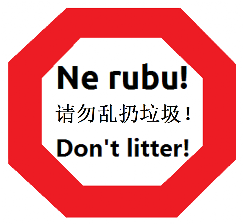English - NeRubu

Plastrubo estas la plej granda medikatastrofo, kiu minacas nian planedon!





Main menu:
Our planet is drowning in plastic waste
Today, in the face of the acute danger from global climate warming, mankind recognises that the greatest environmental threat is from CO2 emissions, but, due to the current effects of global warming, another disaster, whose gigantic dimensions have generally entered public awareness only over the last two years, has effectively been neglected at the same time. Our whole planet is slowly but steadily being flooded with enormous quantities of microplastics. This affects the soils on all six inhabited continents and all seas between the Arctic and the Antarctic.
While technical solutions have already been found for the problem of CO2 emissions, through the replacement of fossil fuels by solar energy all over the world, plastic waste remains a problem where all the solutions considered so far have proved absolutely futile. And while it may be expected that the CO2 quantities in our atmosphere will gradually diminish again with the replacement of the last petrol and diesel engine on our planet, the plastic waste discarded into our environment is preserved virtually forever, unless it is removed mechanically. A practically impossible task!
If we divide the eras of human history on the basis of working materials used by humans, then today, after the Stone, Bronze and Iron Ages, we live in the Plastic Age. Today, plastic in the most varied forms plays an important role in the daily lives of all people on the entire planet. The benefits of plastic are diverse and obvious. Plastic is cheap to produce from crude oil and biological waste, plastic has a low weight and corrodes very slowly. As plastic burns easily, it is also very easy to destroy through incineration.
The problem with microplastics
On the one hand, microplastic parts are released into the environment due to the fact that, in nature, plastic parts are crushed by erosion and spread over the environment by water and wind. Via streams and rivers, these materials are released into lakes and finally the sea, but much of this also ends up in soils and, via food consumption, basically reaches all organisms on the planet.
However, plastic is released into the environment not only via inappropriate packaging but also via building materials and, even worse, via nanoparticles which are used in the most varied areas of life, where a layperson would never even suspect them. In this way, micro and nano plastic parts are found, for instance, in scouring agents, peelings and/or binders in cosmetics, hair and personal care products, detergents, toothpastes, paints, lacquers, or building materials.
#NeRubu
#dontlitter
#请勿乱扔垃圾
Let us launch worldwide campaign «Ne Rubu!»!
Being
Esperantists, we are in a good position to launch a global campaign via our
worldwide network under the title of «Ne Rubu!» [Do not litter!].
The
object of our campaign is:
- Waste prevention:
The
best and most effective method is to always avoid plastic waste. The most
efficient way to achieve this is to basically give up plastic wherever
appropriate alternatives are available. Useless and unnecessary packaging and
toxic packaging materials should be definitely forbidden. Why should, for
instance, an item that is already packaged be put into an additional plastic
cover, and several of such items again be held together in yet another plastic
packaging? Moreover, in the vast majority of cases, the most environmentally
friendly packaging would be plain cardboard that is not painted at all and let
alone coated with plastic. The packaging scoring the worst is the one made of
composites of very different materials. These are often very difficult to
separate and recycling such substances therefore becomes virtually impossible.
- Recycling:
This
leads us to the second section: Of course, packaging will still be needed in
the future, as packaging, for instance, protects food against contamination and
spoilage. Now, it is crucial for such packaging materials to be recycled. To
this end, it is important in production that individual packages are always
made, if possible, of one single material each. At the same time, the number of
permitted plastic materials should be reduced, so that it will be easier to sort
and dispose of them correctly. If, for instance, only the same two types of
plastic plus paper, cardboard and sheet steel were used everywhere, all waste all
over the world could be easily separated and recycled through six different
collection containers. This is how we could change from a through-away to a
recycling society.
- Residual waste incineration:
A
huge problem is that in large parts of the world residual waste is not
incinerated but deposited in landfills, and from there a significant part is
brought into the environment by rain and wind and is finally released into the
oceans. The European countries, in particular, could engage in a targeted
development assistance, in their own interest, by helping less developed
countries to build waste incineration plants and to set up a functioning
disposal and recycling system. There, our «Ne Rubu!» campaign is meant to
support such projects in a targeted manner and to promote awareness in
politicians through global pressure on public opinion.
- Tidying and cleaning up the planet:
After
successfully remedying the causes of global litter pollution, here we go with
tidying up. Initiatives such as the recently launched Clean Ocean project or
the plogging movement pursue such an approach. With the «Ne Rubu!» campaign, we
would like to support these projects and start many more tidying campaigns of
all sorts.
A
special feature of the «Ne Rubu!» action is that this campaign does not
represent a centrally controlled organisation or specific NGO and that everyone
can support «Ne Rubu!» in his own way. Everyone can report on his activities
via the hashtag #NeRubu or the pages of a variety of social media, and become a
NeRubu-Ambasadoro himself.
For
more information on the campaign, please visit the website http://informejo.com/nerubu.
What
can you as Esperantists concretely do?
- Firstly,
you can translate this information and the information on the website from
Esperanto into your local languages.
- Secondly,
you can form local action teams and consider what concrete steps you could take
in your town or village right away.
- Thirdly,
you can inform your local press and your local media about «Ne Rubu!» and at
the same time advertise «Ne Rubu!» via all your personal channels on your
social media. While doing so, please use the «Ne Rubu!» stop signet shown here
(you can download the signet from the website) and always add the hashtag
#NeRubu to your messages.
- Lastly, you can support «Ne Rubu!» by donating
via the crowdfunding platform introduced on the website. There, you can support
the platform itself or one of the projects presented on the platform and, of
course, you can also launch a crowdfunding campaign for your own «Ne Rubu!»
project.
Support
the «Ne Rubu!» campaign! Become a «NeRubu-Ambasadoro!»




